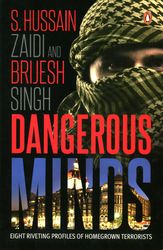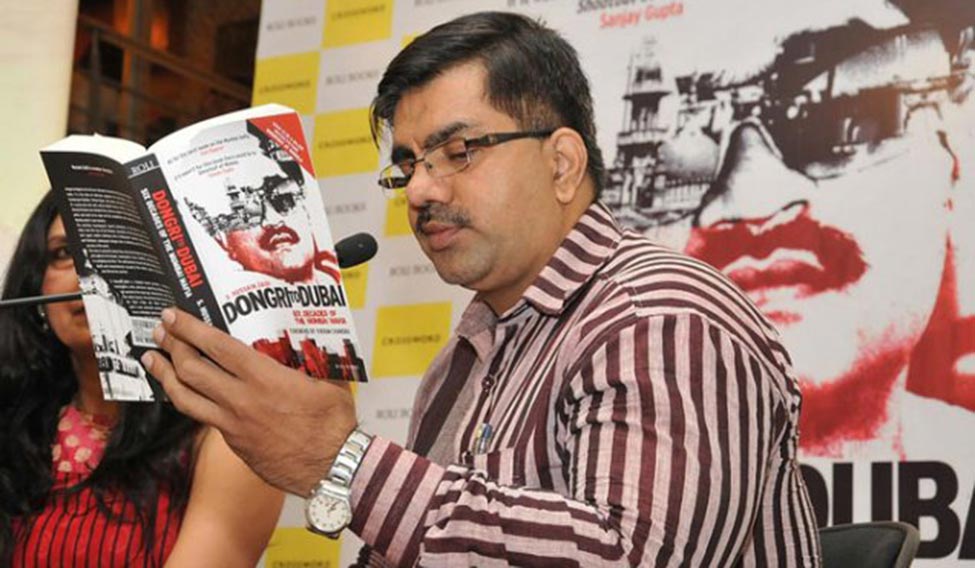It is difficult to get hold of S. Hussain Zaidi these days. The best time to talk to the renowned journalist-author is midnight. THE WEEK, however, managed to catch up with him on a rainy evening, while driving through the bylanes of Mumbai. Born and bred in Mumbai, Zaidi knows the city, with its shades of white, black and grey, in and out. Several of his critically acclaimed books, like Black Friday: The True Story of the Bombay Bomb Blasts and Dongri to Dubai: Six Decades of the Mumbai Mafia, have been 'inspirations' for movies. Zaidi was also the associate producer of Terror in Mumbai, an HBO documentary based on the 26/11 terror attacks.
From decoding the organised crime syndicates of the underworld, he is now exploring the minds of jihadists in his latest book, Dangerous Minds, which he has coauthored with IPS officer Brijesh Singh. Excerpts from an interview:
You have written so much about the underworld and organised crime. How is jihad different?
Organised crime and terrorism are two sides of the same coin. While one kills for money, the other kills for religion. Jihad is an industry now—a juggernaut that is sucking gullible young men into its fold.
What motivated you to write about radicalisation this time?
The idea of terrorism is based on a lie. Young men are trained to think in a particular way right from their adolescence. They are constantly fed with an ideology that does not exist anywhere but in the minds of the purveyor of terrorism. While I understood the compulsions of these groups of men who have not learnt anything but a convoluted view of Islam, I was taken aback by... men with reason, intellect and education suddenly turning into terrorists. I was talking to my friend, Brijesh Singh, who is an IPS officer, about it [and] that was the genesis of Dangerous Minds.
Does the mafia still pose a big threat?
After their initial years, there was a time when political compulsions drove the mafia. Like when the IB needed Chhota Rajan, Shiv Sena needed Arun Gawli and the ISI in Pakistan needed Dawood Ibrahim. But that was just a passing phase. Now, the big daddies of crime are no longer in the race and some of them have got their comeuppance. The mafia in Mumbai is on the wane now. Chhota Rajan is in jail, Dawood is battling his own ghosts, Arun Gawli is cooling his heels in jail and Ashwin Naik is a retired don. There are a few others who have replaced the big dons. But since the nineties, after our own perestroika, the mafia has had to shift their business interests, most of them have gone legit and further with police encounters, they simply faded from the picture.
Can you tell us about some of the IS-inspired terror accused you have closely observed.
That was another phase. It is over now, but at its peak, young Muslim men were drawn to it like moth to flame. There was this boy, Arif Majeed, who had disappeared from his home in Kalyan, a suburb on the outskirts of Mumbai to go to Syria in the lure of becoming an Islamic state fighter and fight for the Caliphate. But when the boys from India went there, they found they were cleaning toilets and treated as slaves. They saw for themselves what the IS was actually doing.
Your profile of convicted SIMI general secretary Saquib Nachan, the mastermind of the Mumbai triple blasts (2002-2003), is interesting.
Nachan is a very different kind of terrorist. He says there is a justification for his actions. He says his attitude towards the Hindus stems from their attitude towards the Muslims. While he has been wronged and often slapped with too many false cases by the police, I have to say that Nachan is a prisoner of his own mind. He has to come out of the victim syndrome. While mistakes are being made on both the sides, violence is not the answer. There is no justification for killings and bloodshed.
Why have you not touched upon saffron terror? Do you believe terrorism has no colour?
We have seen two kinds of jihad—Islamic terror and saffron terror. The justification for terror from both the extremists from these communities is always the same. They feel their religion is under threat, they feel the people from other religion are victimising them. They seek justification in religion for their acts of aggression. Terrorism has no colour. Saffron terror reared its head a couple of years ago with organisations like the Abhinav Bharat. Unfortunately, none of the cases against them have seen conviction which is why I could not write about them.
You have talked about the ISI's K2 mission (a combination of Kashmir and Khalistan) to launch a joint onslaught on India. Do you think that mission is over?
When General Zia-ul-Haq took over as the President of Pakistan in 1971, he followed a one-point agenda—to destabilise India. After fanning the fires of Kashmir militancy and aiding the Khalistani separatists or Sikh ultras, the ISI decided to combine the warlords of both these groups to launch a joint onslaught against India. This mission was called the K2. The fact is that the K2 philosophy is back and it is being revived.
You have made an interesting analogy of the Trojan horse to describe how Indian agencies had successfully planted a mole in Pakistani territory.
It was a former officer with the Intelligence Bureau who thought of the unconventional idea of planting a mole, a Trojan Horse, in [terror accused] Jalees Ansari's group. Ansari was accused of carrying out the serial blasts in various long-distance trains on the occasion of the first anniversary of the demolition of Babri Masjid. The mole converted to Islam, became sympathetic towards the religion and lived for months with them. That is why, the agencies used the codename Trojan Tiger for the intelligence operation. The book describes how Ansari only got arrested after the mole disappeared.
What can your readers look forward to next?

There is a book on the anvil on the man who made Dawood Ibrahim, who tutored him and mentored him. The project is a prequel to Dongri to Dubai.
Dangerous Minds: Eight Riveting Profiles of Homegrown Terrorists
By S. Hussain Zaidi and Brijesh Singh
Published by Penguin Random House India Pvt Ltd
Price Rs 299; pages 259







